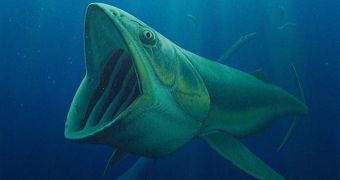Filter feeders are animals that live most often in the water, which are specialized in feeding off of suspended matter floating in seas and oceans. These animals, birds and fish mostly, tend to feature specialized filtering structures in their mouths, which allows them to select the food of interest, while discarding everything else. A recent discovery shows that this type of animal has been around for a much longer time than initially believed, Nature News reports.
According to the new study, these animals may have endured for as much as 100 million years, when they developed in Asia, North America and Europe. Fossil records reveal that several members of the species were alive for a much longer time than initially estimated, says University of Oxford palaeobiologist Matt Friedman. He is also the author of a new paper detailing the findings, which appears in the February 18 issue of the esteemed journal Science. The recent investigation, the expert says, has been conducted on fossils already available in museums, but which had received erroneous interpretations, or have remained unstudied since being first discovered.
“Given how widespread they were and how long they appear in the geological records, I think it's an important finding that's really going to force us to think about what role these bony fish had,” says Smithsonian Institution National Museum of Natural History fossil marine vertebrate expert, Nick Pyenson. Fossil records revealed that filter feeders did not live for just 20 million years in the Mesozoic Era, as first estimated, but rather extended from 170 to 65 million years ago. This discovery is very important for understanding the way food webs were set up throughout the Mesozoic Era.
This geological time epoch spans from 251 to 65 million years ago, as in from the Permian–Triassic (P–Tr) to the Cretaceous–Tertiary extinction events. The latter saw the complete extinction of dinosaurs, and allowed mammals to gain control of the world. But paleobiologists have always been puzzled by the fact that the fossil record did not seem to indicate the presence of any filter feeders, even though data shows that plankton populations were sufficiently developed to sustain such predators. The new finding answers this mystery, and allows for the ecosystems of the past to be better understood.

 14 DAY TRIAL //
14 DAY TRIAL //